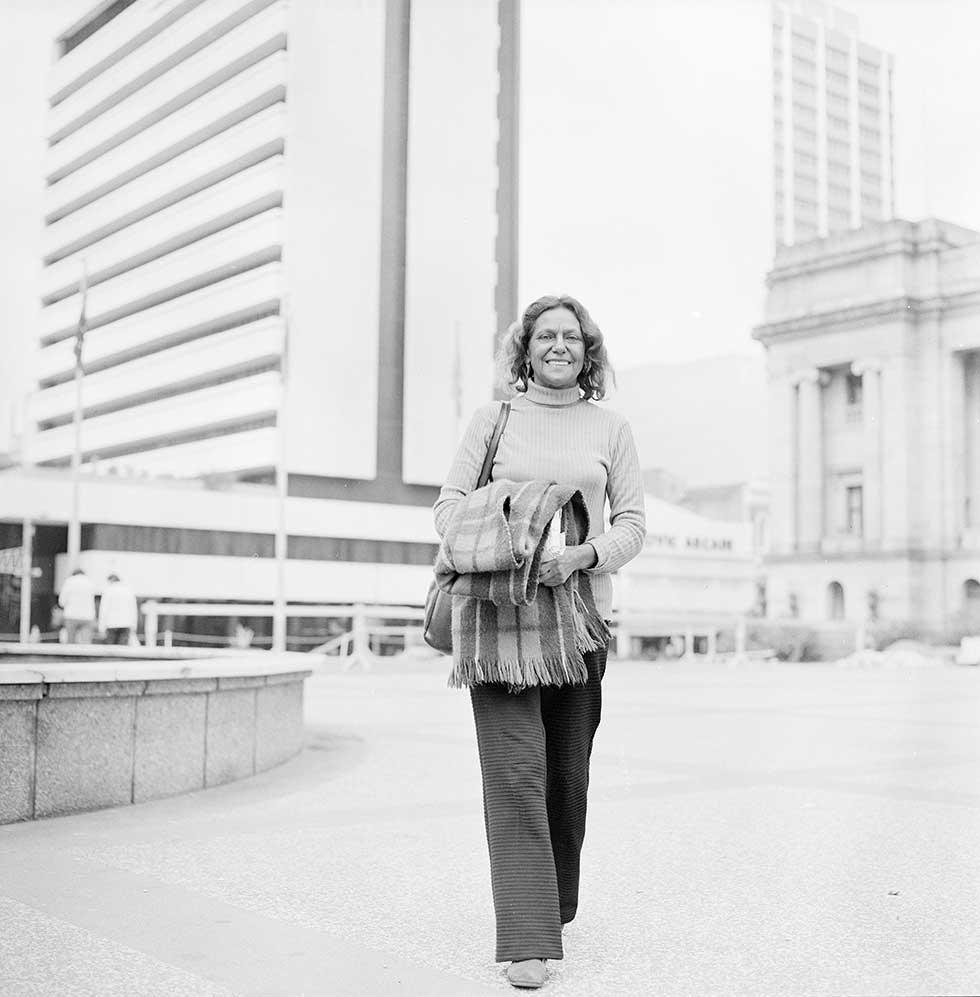


About this record
This black-and-white photograph shows Kath Walker, later known as Oodgeroo Noonuccal, an Aboriginal poet, artist, conservationist and political activist. She is warmly dressed in a jumper and pants and is holding a blanket. The photograph was taken in an urban setting by the Australian Information Service on or before 23 July 1974. At the time she was known as Kath Walker but in 1988 changed her name to Oodgeroo Noonuccal.
Educational value
- At the time of this photograph Oodgeroo Noonuccal had been an internationally acclaimed poet for ten years. In 1964 she became one of Australia’s first published Aboriginal poets with the release of We are Going: Poems by Kath Walker. This was followed by collections of poetry, prose and art including The Dawn is at Hand in 1966. The year after this photograph was taken, Noonuccal received the Jessie Litchfield Award for Literature.
- In interviews, Noonuccal identified Aboriginal people as the inspiration for her work, seeing herself as expressing the voices of her community. She saw poetry as the most personal form of written expression and as a natural extension of Aboriginal oral traditions of storytelling and song-making.
- Noonuccal was active in the 1960s civil rights movement and in the campaign for the 1967 referendum, which urged the removal of passages in the Australian Constitution which discriminated against Aboriginal people. In 1969 she became the first Aboriginal Australian to run for a seat in a state parliament, but she was unsuccessful in gaining a majority vote. She played a prominent role as a Queensland representative on the Federal Council for the Advancement of Aborigines and Torres Strait Islanders (FCAATSI) and its predecessor the Federal Council for Aboriginal Advancement, urging members to unite to fight for human rights.
- Noonuccal was born on Minjerribah (North Stradbroke Island) in south-eastern Queensland. She returned there in 1971 and established Moongalba, a ‘sitting down place’, which she used as an education and cultural centre. Environmental protection was a major theme of her work there.
- Seven years after this photograph was taken, she wrote and illustrated a children’s book Father Sky and Mother Earth, which helped popularise books with Aboriginal and environmental themes.
- In 1970, four years before this photograph was taken, Noonuccal had been appointed a Member of the Order of the British Empire (MBE) for services to the community. At the time, she accepted the honour in the belief that it would raise awareness of issues affecting Aboriginal people. In 1987 she returned the award in protest against the planned 1988 bicentenary celebrations to mark the 200th anniversary of British colonisation of Australia. For Aboriginal people, she said, there had been 200 years of ‘rape and carnage’.
- Noonuccal’s decision to return the MBE coincided with her adoption of a name that would identify more closely with her Aboriginality. ‘Oodgeroo’, meaning ‘paperbark tree’ (whose bark is used for drawing), referred to her role as writer and artist. ‘Noonuccal’ is the name of her people, the traditional owners of Minjerribah and adjoining land for more than 20,000 years.
Acknowledgments
Learning resource text © Education Services Australia Limited and the National Archives of Australia 2010.
Related themes
Need help with your research?
Learn how to interpret primary sources, use our collection and more.





